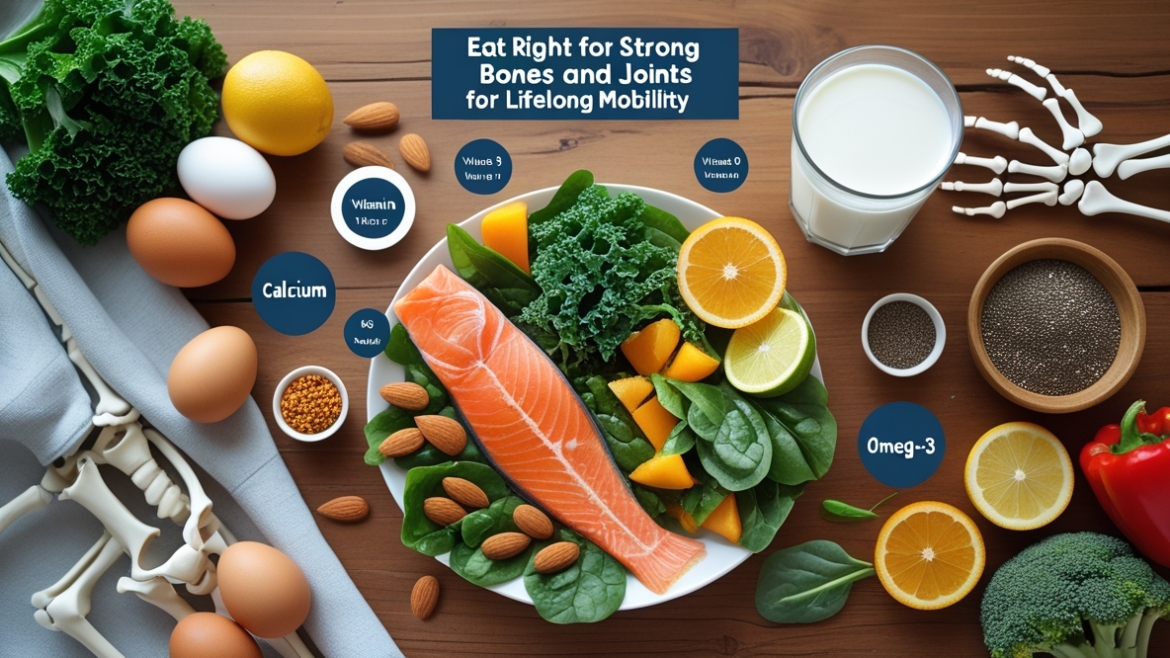Diet and Keeping Bones and Joints Healthy
Maintaining strong bones and healthy joints is essential for overall well-being and mobility, especially as we age. A balanced diet rich in specific nutrients plays a crucial role in maintaining bone strength and joint agility and thus preventing conditions like osteoporosis and arthritis.
Key Nutrients for Bone Health
Calcium: Calcium is the most critical mineral for bone health. It provides the structural component of bones and teeth. Dairy products like milk, cheese, and yogurt are excellent sources of calcium. For those who are lactose intolerant or prefer plant-based options, fortified plant milks, leafy green vegetables like kale and broccoli, and almonds are good alternatives.
Vitamin D: Vitamin D is essential for calcium absorption its metabolism and bone formation. Without sufficient vitamin D, bones can become thin and brittle. Fats are the main source of Vitamin D but it remains in incative forms in food. Sunlight exposure at the middle of the day is essential for conversion of this inactive form to an active form at skin, which has a very subtle self-life. All kind of animal or plant source of fat are rich in Vitamin D precursor, specially buter, ghee, egg yolk, fish oil. Cooking oils, milk and other dairy products are alsofortified with vitamin D precursor to prevent deficiency of vitamin D.
Protein: Protein is vital nutrition for building block of bone matrix on which calcium and other minarel can deposit to make it a strong structural support. Protein also helps in maintaining muscle mass which is responsiblr indirectly for maintaining bone mas and density. Lean meats, poultry, fish, eggs, dairy products, legumes, and nuts are excellent protein sources.
Magnesium: Magnesium helps in the formation of bone crystals and supports calcium metabolism. Foods rich in magnesium include nuts, seeds, whole grains, and green leafy vegetables.
Vitamin K: Vitamin K is crucial for bone metabolism and the regulation of calcium in the body. It can be found in green leafy vegetables, such as spinach, kale, and Swiss chard.
Nutrients for Joint Health
Omega-3 Fatty Acids: Omega-3 fatty acids have anti-inflammatory properties that can help reduce joint pain and stiffness. They are abundant in fatty fish, such as salmon, mackerel, and sardines, as well as in flaxseeds, chia seeds, and walnuts.
Vitamin C: Vitamin C is necessary for the synthesis of collagen, a major component of cartilage. It also has antioxidant properties that protect joints from damage. Citrus fruits, strawberries, bell peppers, and broccoli are high in vitamin C.
Glucosamine and Chondroitin: These compounds are naturally found in cartilage and are often taken as supplements to support joint health. They can help reduce symptoms of osteoarthritis and improve joint function.
Antioxidants: Antioxidants like vitamins E and A can help protect joints from oxidative stress. Nuts, seeds, spinach, and sweet potatoes are excellent sources.
Lifestyle Tips
Hydration: Staying hydrated is crucial for maintaining the lubrication of joints. Water and hydrating foods like cucumbers and melons are beneficial.
Balanced Diet: A varied diet that includes fruits, vegetables, lean proteins, and whole grains ensures you get a wide range of nutrients necessary for bone and joint health.
Avoid Excessive Salt and Sugar: High salt and sugar intake can deplete calcium and contribute to inflammation, respectively. Moderation is key.
In conclusion, a nutrient-rich diet is fundamental to maintaining healthy bones and joints. By incorporating foods high in calcium, vitamin D, omega-3 fatty acids, and antioxidants, and staying hydrated, you can support your skeletal system and enjoy better mobility and overall health.

